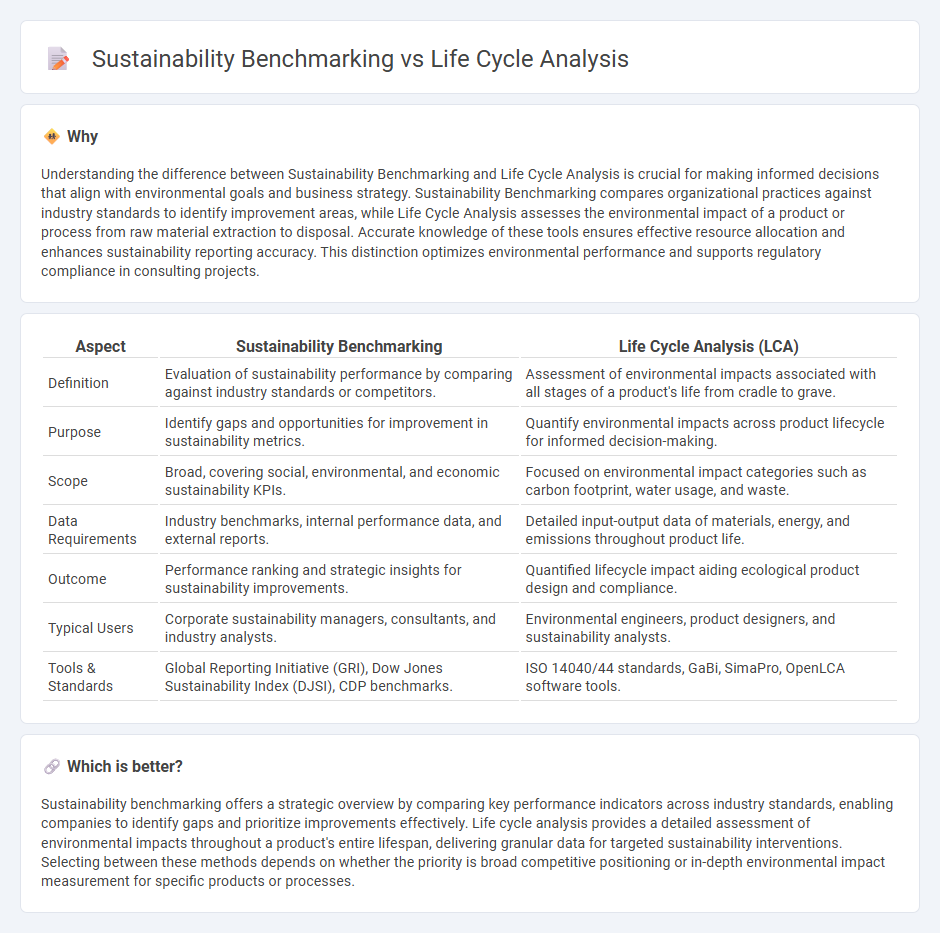
Sustainability benchmarking measures an organization's environmental, social, and economic performance against industry standards, providing a clear snapshot of sustainability effectiveness. Life cycle analysis evaluates the environmental impacts of a product or process from raw material extraction to disposal, offering a comprehensive view of ecological footprint. Explore the differences to determine which approach best aligns with your sustainability goals.
Why it is important
Understanding the difference between Sustainability Benchmarking and Life Cycle Analysis is crucial for making informed decisions that align with environmental goals and business strategy. Sustainability Benchmarking compares organizational practices against industry standards to identify improvement areas, while Life Cycle Analysis assesses the environmental impact of a product or process from raw material extraction to disposal. Accurate knowledge of these tools ensures effective resource allocation and enhances sustainability reporting accuracy. This distinction optimizes environmental performance and supports regulatory compliance in consulting projects.
Comparison Table
| Aspect | Sustainability Benchmarking | Life Cycle Analysis (LCA) |
|---|---|---|
| Definition | Evaluation of sustainability performance by comparing against industry standards or competitors. | Assessment of environmental impacts associated with all stages of a product's life from cradle to grave. |
| Purpose | Identify gaps and opportunities for improvement in sustainability metrics. | Quantify environmental impacts across product lifecycle for informed decision-making. |
| Scope | Broad, covering social, environmental, and economic sustainability KPIs. | Focused on environmental impact categories such as carbon footprint, water usage, and waste. |
| Data Requirements | Industry benchmarks, internal performance data, and external reports. | Detailed input-output data of materials, energy, and emissions throughout product life. |
| Outcome | Performance ranking and strategic insights for sustainability improvements. | Quantified lifecycle impact aiding ecological product design and compliance. |
| Typical Users | Corporate sustainability managers, consultants, and industry analysts. | Environmental engineers, product designers, and sustainability analysts. |
| Tools & Standards | Global Reporting Initiative (GRI), Dow Jones Sustainability Index (DJSI), CDP benchmarks. | ISO 14040/44 standards, GaBi, SimaPro, OpenLCA software tools. |
Which is better?
Sustainability benchmarking offers a strategic overview by comparing key performance indicators across industry standards, enabling companies to identify gaps and prioritize improvements effectively. Life cycle analysis provides a detailed assessment of environmental impacts throughout a product's entire lifespan, delivering granular data for targeted sustainability interventions. Selecting between these methods depends on whether the priority is broad competitive positioning or in-depth environmental impact measurement for specific products or processes.
Connection
Sustainability benchmarking evaluates environmental performance by comparing key metrics against industry standards, while Life Cycle Analysis (LCA) assesses the environmental impacts of products or services throughout their entire lifespan. Integrating LCA data into sustainability benchmarking provides a comprehensive framework for identifying areas of improvement and measuring progress towards sustainability goals. This connection enables consultants to develop actionable strategies that minimize ecological footprints and enhance overall corporate responsibility.
Key Terms
Environmental Impact Assessment
Life cycle analysis (LCA) quantifies the environmental impacts of a product or process from raw material extraction to disposal, providing detailed insights into carbon footprint, energy use, and resource depletion. Sustainability benchmarking compares an organization's environmental performance against industry standards or competitors, highlighting areas for improvement and best practices adoption. Explore more to understand how integrating LCA with sustainability benchmarking enhances environmental impact assessment and drives targeted sustainability strategies.
Performance Indicators
Life cycle analysis (LCA) evaluates environmental impacts across a product's entire lifespan, emphasizing metrics such as carbon footprint, energy consumption, and waste generation. Sustainability benchmarking compares organizational or product performance against industry standards or competitors, using key performance indicators (KPIs) like water usage efficiency, greenhouse gas emissions, and social responsibility scores. Explore detailed methodologies and indicator selection criteria to enhance your sustainability strategy.
Comparative Metrics
Life cycle analysis (LCA) provides a comprehensive assessment of environmental impacts across all stages of a product's life, including raw material extraction, manufacturing, usage, and disposal, emphasizing energy consumption and emissions. Sustainability benchmarking, on the other hand, evaluates a company or product's performance against industry standards or competitors using key sustainability metrics such as carbon footprint, water usage, and social responsibility indicators. Explore detailed methodologies and comparative metrics to optimize environmental and social performance effectively.
Source and External Links
Life Cycle Assessment (LCA) - Everything you need to know - LCA measures environmental impacts of a product through all stages of its life, from raw material extraction to waste disposal, following structured phases: goal and scope, inventory analysis, impact assessment, and interpretation.
Life Cycle Assessment (LCA) explained - PRe Sustainability - LCA evaluates the environmental effects of a product, process, or service across its entire life cycle, helping businesses identify improvement opportunities and support sustainability decisions.
Life-cycle assessment - Wikipedia - LCA is a standardized methodology for assessing environmental impacts associated with all stages of a product's life, focusing on quantifying inputs, outputs, and emissions using detailed inventories and flow models.
 dowidth.com
dowidth.com